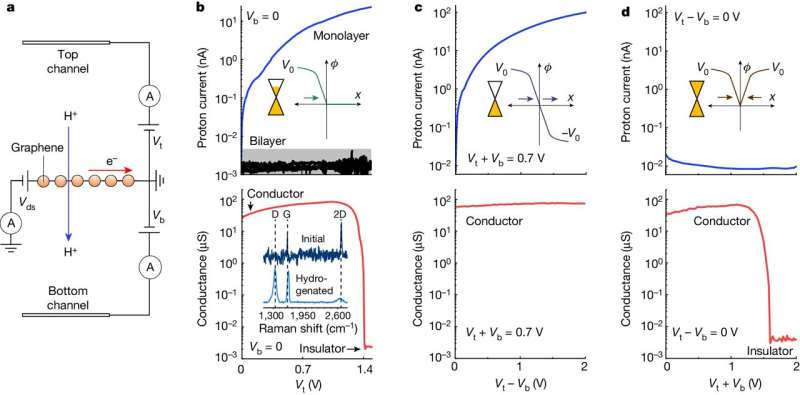This article has been reviewed according to Science X's editorial process and policies. Editors have highlighted the following attributes while ensuring the content's credibility:
fact-checked
peer-reviewed publication
trusted source
proofread
Electric fields boost graphene's potential, study shows

Researchers at the National Graphene Institute have made a discovery that could revolutionize energy harnessing and information computing. Their study, published in Nature, reveals how electric field effects can selectively accelerate coupled electrochemical processes in graphene.
Electrochemical processes are essential in renewable energy technologies like batteries, fuel cells, and electrolyzers. However, their efficiency is often hindered by slow reactions and unwanted side effects. Traditional approaches have focused on new materials, yet significant challenges remain.
The Manchester team, led by Dr. Marcelo Lozada-Hidalgo, has taken a novel approach. They have successfully decoupled the inseparable link between charge and electric field within graphene electrodes, enabling unprecedented control over electrochemical processes in this material. The breakthrough challenges previous assumptions and opens new avenues for energy technologies.
Dr. Lozada-Hidalgo sees this discovery as transformative and said, "We've managed to open up a previously inaccessible parameter space. A way to visualize this is to imagine a field in the countryside with hills and valleys. Classically, for a given system and a given catalyst, an electrochemical process would run through a set path through this field.
"If the path goes through a high hill or a deep valley—bad luck. Our work shows that, at least for the processes we investigated here, we have access to the whole field. If there is a hill or valley we do not want to go to, we can avoid it."
The study focuses on proton-related processes fundamental for hydrogen catalysts and electronic devices. Specifically, the team examined two proton processes in graphene:
- Proton transmission: This process is important for developing new hydrogen catalysts and fuel cell membranes.
- Proton adsorption (Hydrogenation): Important for electronic devices like transistors, this process switches graphene's conductivity on and off.
Traditionally, these processes were coupled in graphene devices, making it challenging to control one without impacting the other. The researchers managed to decouple these processes, finding that electric field effects could significantly accelerate proton transmission while independently driving hydrogenation. This selective acceleration was unexpected and presents a new method to drive electrochemical processes.
Highlighting the broader implications in energy applications, Dr. Jincheng Tong, first author of the paper, said, "We demonstrate that electric field effects can disentangle and accelerate electrochemical processes in 2D crystals. This could be combined with state-of-the-art catalysts to efficiently drive complex processes like CO2 reduction, which remain enormous societal challenges."
Dr. Yangming Fu, co-first author, pointed to potential applications in computing and said, "Control of these processes gives our graphene devices dual functionality as both memory and logic gate. This paves the way for new computing networks that operate with protons. This could enable compact, low-energy analog computing devices."
More information: Jincheng Tong et al, Control of proton transport and hydrogenation in double-gated graphene, Nature (2024). DOI: 10.1038/s41586-024-07435-8. www.nature.com/articles/s41586-024-07435-8
Journal information: Nature
Provided by University of Manchester




















